Mental Health in the Community: Stigma, Recovery, and Societal Factors
VerifiedAdded on 2021/04/21
|5
|1172
|51
Essay
AI Summary
This essay explores the pervasive issue of mental health stigma within communities, highlighting its detrimental effects on individuals struggling with mental illness. It examines how societal attitudes, negative stereotypes, and discriminatory behaviors exacerbate conditions, impede treatment, and delay recovery. The essay delves into the concept of recovery in mental health, emphasizing its focus on personal growth, self-direction, and the ability to lead a meaningful life despite mental health challenges. It analyzes how stigma creates barriers to accessing support, healthcare services, and opportunities, affecting self-esteem and overall well-being. The essay references the Australian context, emphasizing that the essay aims to recognize the actions and attitudes that support stigma and discrimination conditions towards individuals with mental illness. By understanding the interplay between stigma and recovery, the essay aims to promote a more supportive and inclusive environment for individuals with mental health conditions.
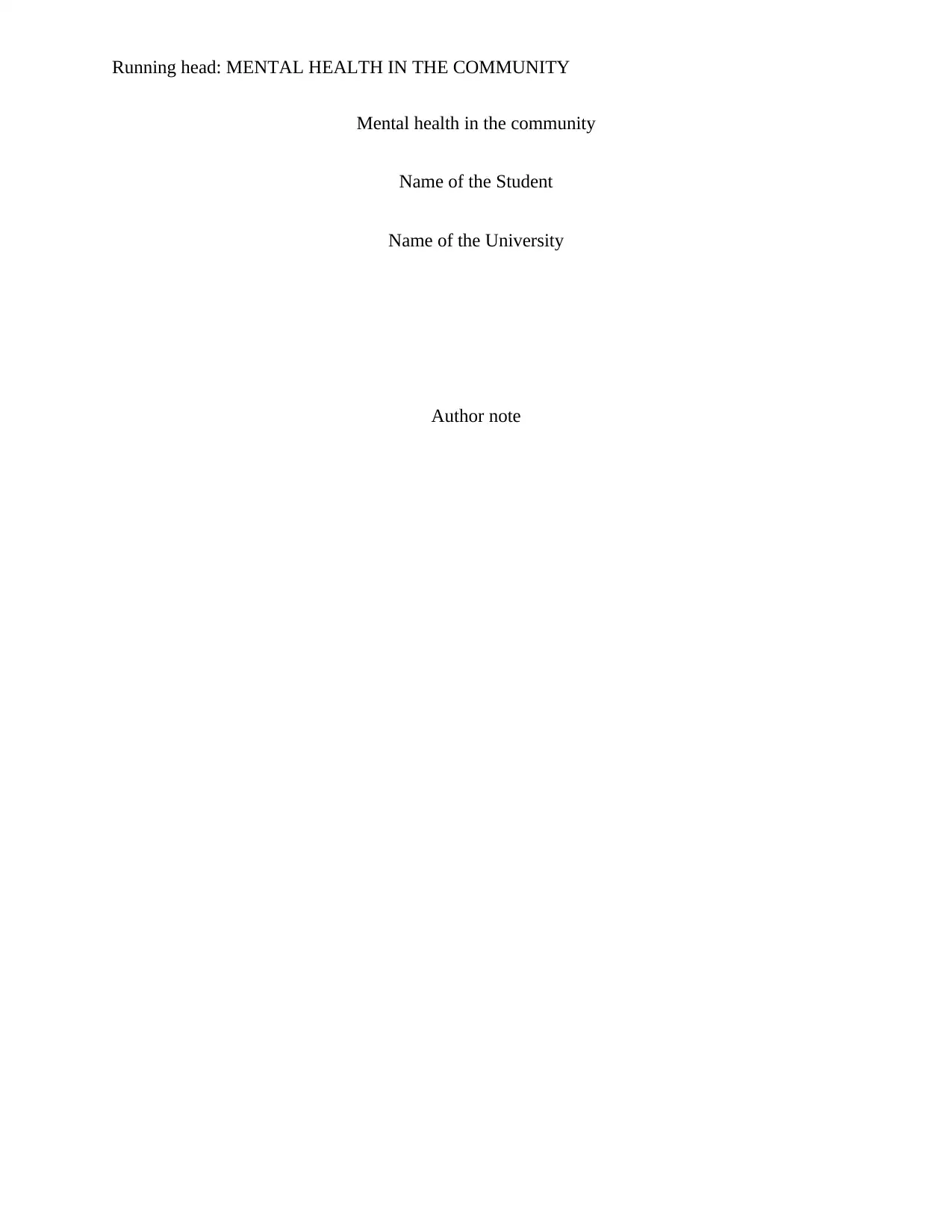
Running head: MENTAL HEALTH IN THE COMMUNITY
Mental health in the community
Name of the Student
Name of the University
Author note
Mental health in the community
Name of the Student
Name of the University
Author note
Paraphrase This Document
Need a fresh take? Get an instant paraphrase of this document with our AI Paraphraser
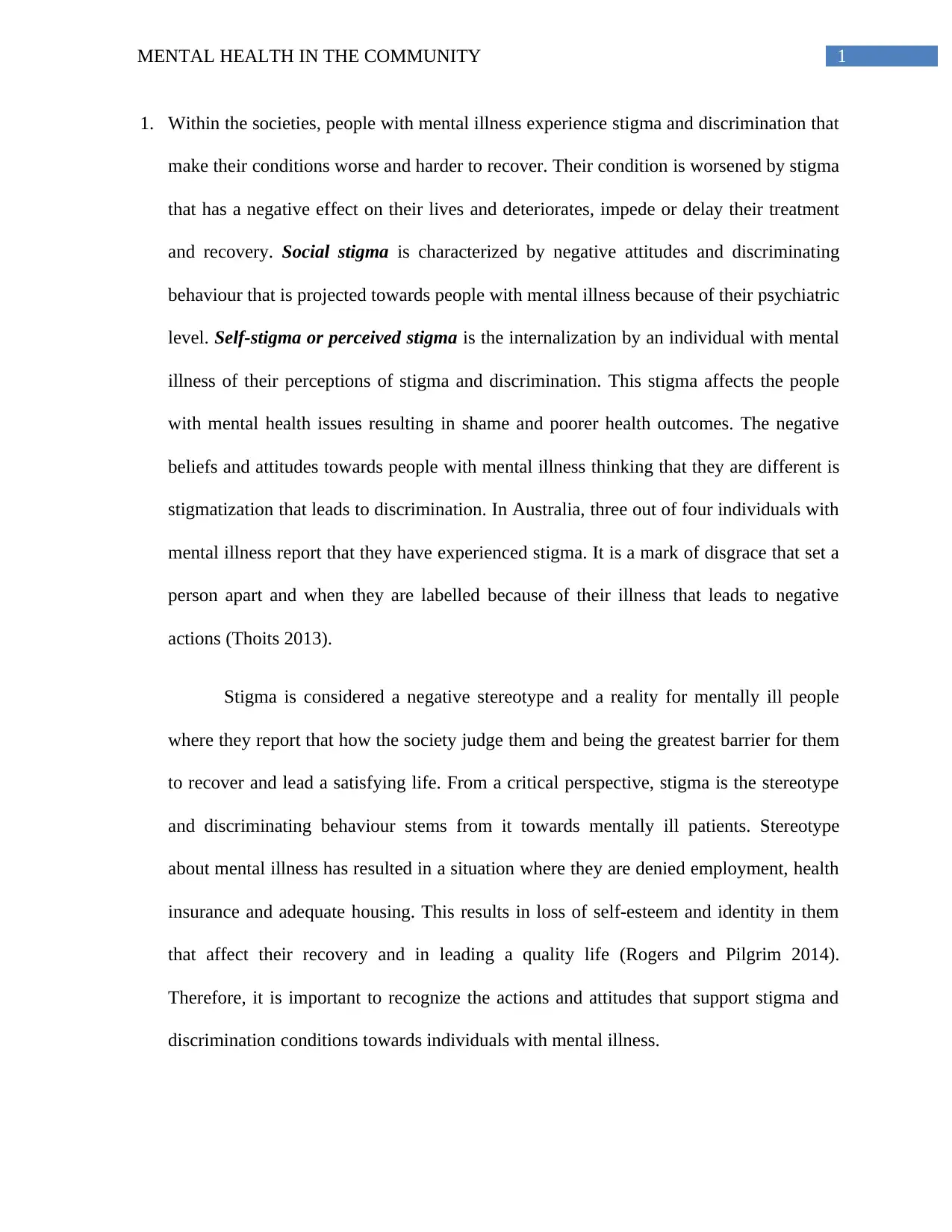
1MENTAL HEALTH IN THE COMMUNITY
1. Within the societies, people with mental illness experience stigma and discrimination that
make their conditions worse and harder to recover. Their condition is worsened by stigma
that has a negative effect on their lives and deteriorates, impede or delay their treatment
and recovery. Social stigma is characterized by negative attitudes and discriminating
behaviour that is projected towards people with mental illness because of their psychiatric
level. Self-stigma or perceived stigma is the internalization by an individual with mental
illness of their perceptions of stigma and discrimination. This stigma affects the people
with mental health issues resulting in shame and poorer health outcomes. The negative
beliefs and attitudes towards people with mental illness thinking that they are different is
stigmatization that leads to discrimination. In Australia, three out of four individuals with
mental illness report that they have experienced stigma. It is a mark of disgrace that set a
person apart and when they are labelled because of their illness that leads to negative
actions (Thoits 2013).
Stigma is considered a negative stereotype and a reality for mentally ill people
where they report that how the society judge them and being the greatest barrier for them
to recover and lead a satisfying life. From a critical perspective, stigma is the stereotype
and discriminating behaviour stems from it towards mentally ill patients. Stereotype
about mental illness has resulted in a situation where they are denied employment, health
insurance and adequate housing. This results in loss of self-esteem and identity in them
that affect their recovery and in leading a quality life (Rogers and Pilgrim 2014).
Therefore, it is important to recognize the actions and attitudes that support stigma and
discrimination conditions towards individuals with mental illness.
1. Within the societies, people with mental illness experience stigma and discrimination that
make their conditions worse and harder to recover. Their condition is worsened by stigma
that has a negative effect on their lives and deteriorates, impede or delay their treatment
and recovery. Social stigma is characterized by negative attitudes and discriminating
behaviour that is projected towards people with mental illness because of their psychiatric
level. Self-stigma or perceived stigma is the internalization by an individual with mental
illness of their perceptions of stigma and discrimination. This stigma affects the people
with mental health issues resulting in shame and poorer health outcomes. The negative
beliefs and attitudes towards people with mental illness thinking that they are different is
stigmatization that leads to discrimination. In Australia, three out of four individuals with
mental illness report that they have experienced stigma. It is a mark of disgrace that set a
person apart and when they are labelled because of their illness that leads to negative
actions (Thoits 2013).
Stigma is considered a negative stereotype and a reality for mentally ill people
where they report that how the society judge them and being the greatest barrier for them
to recover and lead a satisfying life. From a critical perspective, stigma is the stereotype
and discriminating behaviour stems from it towards mentally ill patients. Stereotype
about mental illness has resulted in a situation where they are denied employment, health
insurance and adequate housing. This results in loss of self-esteem and identity in them
that affect their recovery and in leading a quality life (Rogers and Pilgrim 2014).
Therefore, it is important to recognize the actions and attitudes that support stigma and
discrimination conditions towards individuals with mental illness.
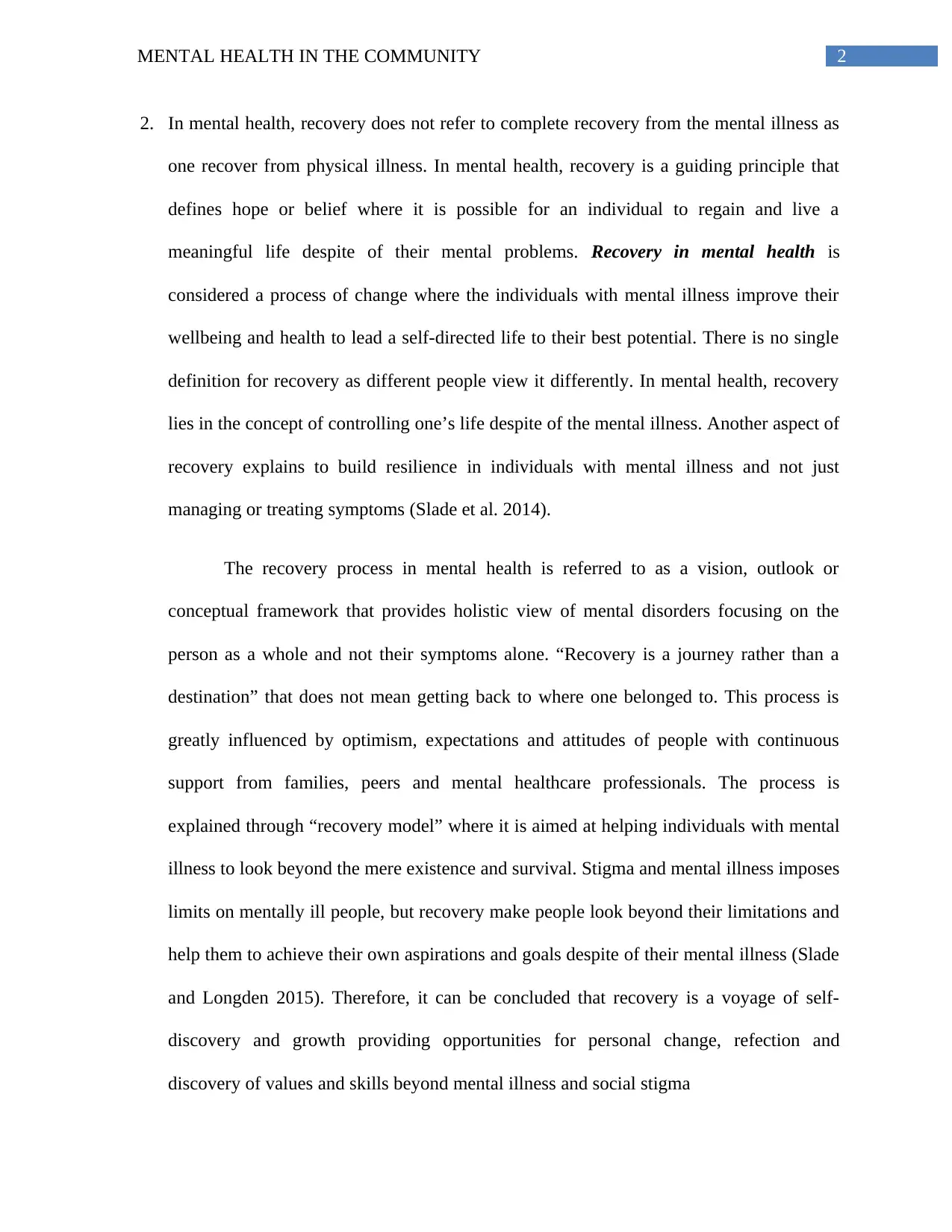
2MENTAL HEALTH IN THE COMMUNITY
2. In mental health, recovery does not refer to complete recovery from the mental illness as
one recover from physical illness. In mental health, recovery is a guiding principle that
defines hope or belief where it is possible for an individual to regain and live a
meaningful life despite of their mental problems. Recovery in mental health is
considered a process of change where the individuals with mental illness improve their
wellbeing and health to lead a self-directed life to their best potential. There is no single
definition for recovery as different people view it differently. In mental health, recovery
lies in the concept of controlling one’s life despite of the mental illness. Another aspect of
recovery explains to build resilience in individuals with mental illness and not just
managing or treating symptoms (Slade et al. 2014).
The recovery process in mental health is referred to as a vision, outlook or
conceptual framework that provides holistic view of mental disorders focusing on the
person as a whole and not their symptoms alone. “Recovery is a journey rather than a
destination” that does not mean getting back to where one belonged to. This process is
greatly influenced by optimism, expectations and attitudes of people with continuous
support from families, peers and mental healthcare professionals. The process is
explained through “recovery model” where it is aimed at helping individuals with mental
illness to look beyond the mere existence and survival. Stigma and mental illness imposes
limits on mentally ill people, but recovery make people look beyond their limitations and
help them to achieve their own aspirations and goals despite of their mental illness (Slade
and Longden 2015). Therefore, it can be concluded that recovery is a voyage of self-
discovery and growth providing opportunities for personal change, refection and
discovery of values and skills beyond mental illness and social stigma
2. In mental health, recovery does not refer to complete recovery from the mental illness as
one recover from physical illness. In mental health, recovery is a guiding principle that
defines hope or belief where it is possible for an individual to regain and live a
meaningful life despite of their mental problems. Recovery in mental health is
considered a process of change where the individuals with mental illness improve their
wellbeing and health to lead a self-directed life to their best potential. There is no single
definition for recovery as different people view it differently. In mental health, recovery
lies in the concept of controlling one’s life despite of the mental illness. Another aspect of
recovery explains to build resilience in individuals with mental illness and not just
managing or treating symptoms (Slade et al. 2014).
The recovery process in mental health is referred to as a vision, outlook or
conceptual framework that provides holistic view of mental disorders focusing on the
person as a whole and not their symptoms alone. “Recovery is a journey rather than a
destination” that does not mean getting back to where one belonged to. This process is
greatly influenced by optimism, expectations and attitudes of people with continuous
support from families, peers and mental healthcare professionals. The process is
explained through “recovery model” where it is aimed at helping individuals with mental
illness to look beyond the mere existence and survival. Stigma and mental illness imposes
limits on mentally ill people, but recovery make people look beyond their limitations and
help them to achieve their own aspirations and goals despite of their mental illness (Slade
and Longden 2015). Therefore, it can be concluded that recovery is a voyage of self-
discovery and growth providing opportunities for personal change, refection and
discovery of values and skills beyond mental illness and social stigma
⊘ This is a preview!⊘
Do you want full access?
Subscribe today to unlock all pages.

Trusted by 1+ million students worldwide
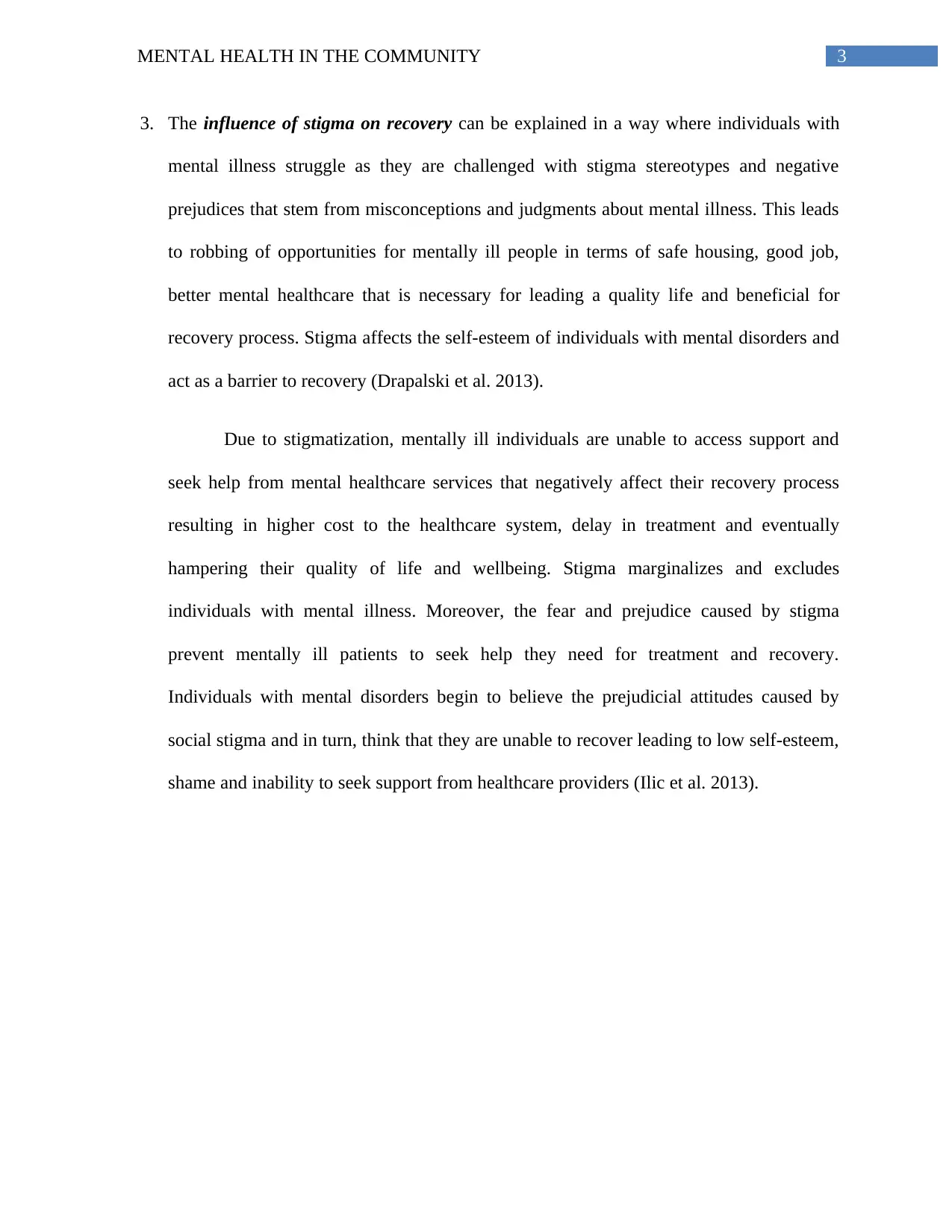
3MENTAL HEALTH IN THE COMMUNITY
3. The influence of stigma on recovery can be explained in a way where individuals with
mental illness struggle as they are challenged with stigma stereotypes and negative
prejudices that stem from misconceptions and judgments about mental illness. This leads
to robbing of opportunities for mentally ill people in terms of safe housing, good job,
better mental healthcare that is necessary for leading a quality life and beneficial for
recovery process. Stigma affects the self-esteem of individuals with mental disorders and
act as a barrier to recovery (Drapalski et al. 2013).
Due to stigmatization, mentally ill individuals are unable to access support and
seek help from mental healthcare services that negatively affect their recovery process
resulting in higher cost to the healthcare system, delay in treatment and eventually
hampering their quality of life and wellbeing. Stigma marginalizes and excludes
individuals with mental illness. Moreover, the fear and prejudice caused by stigma
prevent mentally ill patients to seek help they need for treatment and recovery.
Individuals with mental disorders begin to believe the prejudicial attitudes caused by
social stigma and in turn, think that they are unable to recover leading to low self-esteem,
shame and inability to seek support from healthcare providers (Ilic et al. 2013).
3. The influence of stigma on recovery can be explained in a way where individuals with
mental illness struggle as they are challenged with stigma stereotypes and negative
prejudices that stem from misconceptions and judgments about mental illness. This leads
to robbing of opportunities for mentally ill people in terms of safe housing, good job,
better mental healthcare that is necessary for leading a quality life and beneficial for
recovery process. Stigma affects the self-esteem of individuals with mental disorders and
act as a barrier to recovery (Drapalski et al. 2013).
Due to stigmatization, mentally ill individuals are unable to access support and
seek help from mental healthcare services that negatively affect their recovery process
resulting in higher cost to the healthcare system, delay in treatment and eventually
hampering their quality of life and wellbeing. Stigma marginalizes and excludes
individuals with mental illness. Moreover, the fear and prejudice caused by stigma
prevent mentally ill patients to seek help they need for treatment and recovery.
Individuals with mental disorders begin to believe the prejudicial attitudes caused by
social stigma and in turn, think that they are unable to recover leading to low self-esteem,
shame and inability to seek support from healthcare providers (Ilic et al. 2013).
Paraphrase This Document
Need a fresh take? Get an instant paraphrase of this document with our AI Paraphraser
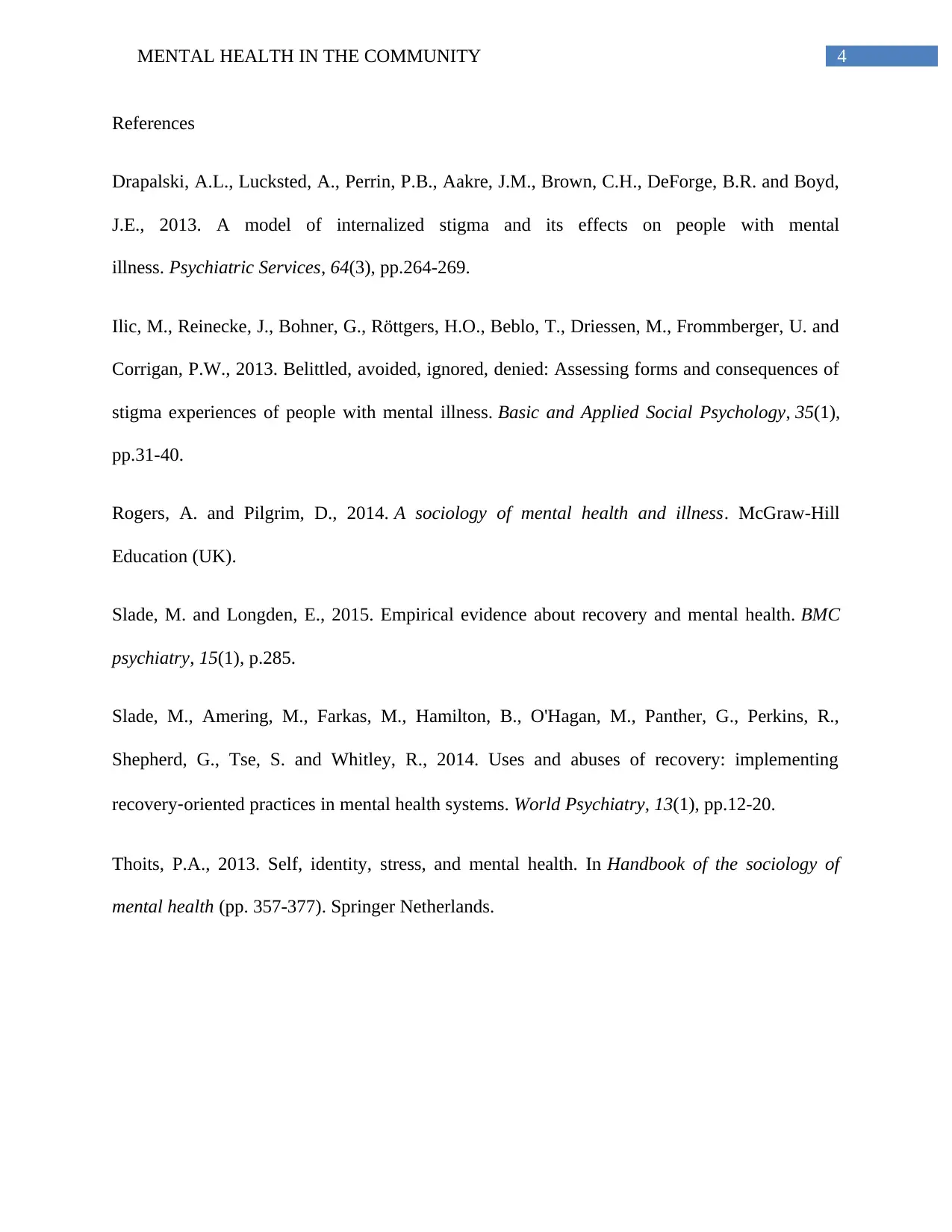
4MENTAL HEALTH IN THE COMMUNITY
References
Drapalski, A.L., Lucksted, A., Perrin, P.B., Aakre, J.M., Brown, C.H., DeForge, B.R. and Boyd,
J.E., 2013. A model of internalized stigma and its effects on people with mental
illness. Psychiatric Services, 64(3), pp.264-269.
Ilic, M., Reinecke, J., Bohner, G., Röttgers, H.O., Beblo, T., Driessen, M., Frommberger, U. and
Corrigan, P.W., 2013. Belittled, avoided, ignored, denied: Assessing forms and consequences of
stigma experiences of people with mental illness. Basic and Applied Social Psychology, 35(1),
pp.31-40.
Rogers, A. and Pilgrim, D., 2014. A sociology of mental health and illness. McGraw-Hill
Education (UK).
Slade, M. and Longden, E., 2015. Empirical evidence about recovery and mental health. BMC
psychiatry, 15(1), p.285.
Slade, M., Amering, M., Farkas, M., Hamilton, B., O'Hagan, M., Panther, G., Perkins, R.,
Shepherd, G., Tse, S. and Whitley, R., 2014. Uses and abuses of recovery: implementing
recovery‐oriented practices in mental health systems. World Psychiatry, 13(1), pp.12-20.
Thoits, P.A., 2013. Self, identity, stress, and mental health. In Handbook of the sociology of
mental health (pp. 357-377). Springer Netherlands.
References
Drapalski, A.L., Lucksted, A., Perrin, P.B., Aakre, J.M., Brown, C.H., DeForge, B.R. and Boyd,
J.E., 2013. A model of internalized stigma and its effects on people with mental
illness. Psychiatric Services, 64(3), pp.264-269.
Ilic, M., Reinecke, J., Bohner, G., Röttgers, H.O., Beblo, T., Driessen, M., Frommberger, U. and
Corrigan, P.W., 2013. Belittled, avoided, ignored, denied: Assessing forms and consequences of
stigma experiences of people with mental illness. Basic and Applied Social Psychology, 35(1),
pp.31-40.
Rogers, A. and Pilgrim, D., 2014. A sociology of mental health and illness. McGraw-Hill
Education (UK).
Slade, M. and Longden, E., 2015. Empirical evidence about recovery and mental health. BMC
psychiatry, 15(1), p.285.
Slade, M., Amering, M., Farkas, M., Hamilton, B., O'Hagan, M., Panther, G., Perkins, R.,
Shepherd, G., Tse, S. and Whitley, R., 2014. Uses and abuses of recovery: implementing
recovery‐oriented practices in mental health systems. World Psychiatry, 13(1), pp.12-20.
Thoits, P.A., 2013. Self, identity, stress, and mental health. In Handbook of the sociology of
mental health (pp. 357-377). Springer Netherlands.
1 out of 5
Related Documents
Your All-in-One AI-Powered Toolkit for Academic Success.
+13062052269
info@desklib.com
Available 24*7 on WhatsApp / Email
![[object Object]](/_next/static/media/star-bottom.7253800d.svg)
Unlock your academic potential
Copyright © 2020–2026 A2Z Services. All Rights Reserved. Developed and managed by ZUCOL.





